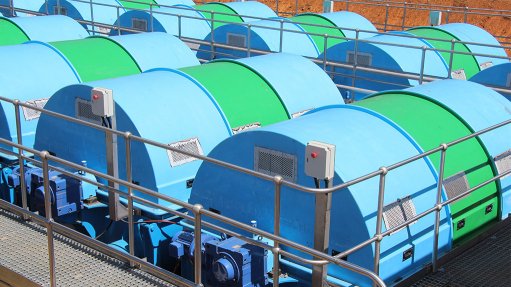
NEW TECHNOLOGY Erwat installed its hybrid bacillus bacterium at its plant in Tsakane
Owing to ageing infrastructure and a shortage of skills in wastewater a number of the wastewater treatment plants of the country’s municipalities are discharging effluent that requires attention, says wastewater treatment utility East Rand Water Care Company (Erwat) MD Tumelo Gopane.
Some municipal wastewater treatment plants are not manned on a 24-hour basis, which implies that there are no operators to ensure continuous monitoring of water quality. Erwat has gone on a full 24-hour shift cycle, which ensures that the quality of water is monitored accordingly.
Gopane states that Erwat is working on various private sector client pretreatment facilities to ensure that they meet the right quality before discharging into municipal wastewater plants.
Erwat is also ready to collaborate with the South African Local Government Association (Salga) and Municipal Infrastructure Support Agent, which was established by the Ministry for Cooperative Governance and Traditional Affairs, as well as directly with municipalities in order to uplift overall compliance around the country.
Meanwhile, Erwat says Salga should be commended for convening a meeting – comprising the heads of the Water and Sanitation Departments from the eight metros, as well as the MDs of Erwat and Joburg Water – in Cape Town last month to revive a City Water Managers Forum.
Gopane says it is imperative that cities and towns work together in developing a coordinated approach to deal with the wastewater management challenges in the country.
He says it would be helpful if the forum further discussed how to pool resources, harness research and development, share technology and, ultimately, launch a geographical information system for the whole country through which all the wastewater infrastructure can be modelled, monitored and analysed to ensure coordinated planning.
“Our next meeting is expected to be held around October where we are likely to develop the terms of reference for the forum. The forum supports the idea of coordinated cities and towns planning around water and wastewater collectively”.
Erwat continues to investigate the use of newer technologies in the wastewater industry. Among its newer suite of technologies is the hybrid bacillus bacterium (known as Hybacs) imported from the UK and the Nereda technology from the Netherlands.
Education and Skills Development
In an attempt to mitigate the skills-shortage challenge, Erwat yearly recruits about 80 graduates, in-service trainees and National Qualification Framework gauged learners to train and develop them for a period of between one and four years, where some of them end up as plant managers.
“All our plant managers managing wastewater treatment plants are trained and developed in-house. Most of them go on to seize opportunities in the broader market as business persons or employees in the public and private sectors.”
Gopane says the company is also working on establishing the Erwat Wastewater School of Excellence, hopefully by mid-2019, in an attempt to accelerate closing the skills gap in industry for the entire market, across the country and the African continent, in the public and private sectors.
He adds that the Erwat Wastewater School of Excellence will be open to the entire wastewater treatment industry while ensuring the continuous training and development of its employees.
Gopane says Erwat has the skills and the know-how to manage and treat domestic and industrial wastewater, and the company is always willing to collaborate with municipalities, as well as private sector clients to improve water quality in the country and across the South African border.
“We are globally competitive, and in certain aspects we even surpass the global standards in terms of the quality of water that we discharge into the natural receiving bodies,” Gopane concludes.